From Romans 13:1-7 and 1 Peter 2:13-17 (provided below) we can glean the following five principles.
- Everyone has a responsibility obey governmental authorities.
- Government has legitimate authority, but it does not have absolute authority. The authority it has has been delegated to it by God. Government’s God-assigned task is primarily to punish those who do evil and to commend or reward those who do good. As it does these things, it also maintains order in society, making it easier for Christians to share the gospel effectively (see 1 Tim. 2:1-4 [also provided below]).
- When government fails to do its divinely assigned task of keeping order by commending those who do good and punishing those who do evil, and especially when it ignores or rewards evildoers and punishes those who do good, it is misusing its delegated authority, and its actions are illegitimate. When government’s orders and God’s commands directly conflict, Christians are to obey God.
- Especially in a free society such as ours—a republic, which is ruled by law—when government leaders abuse their God-given authority, Christians are obligated to call them out.
- Government has other legitimate tasks, such as maintaining a military force to defend the country and maintaining monetary and economic systems. These are implicitly affirmed in the Bible (for examples, see Deut. 20:1; Matt. 22:15-22). What Scripture does not authorize government to do is provide for its people. God gives that job to the people themselves (also go here).
13 Let every soul be subject to the governing authorities. For there is no authority except from God, and the authorities that exist are appointed by God. 2 Therefore whoever resists the authority resists the ordinance of God, and those who resist will bring judgment on themselves. 3 For rulers are not a terror to good works, but to evil. Do you want to be unafraid of the authority? Do what is good, and you will have praise from the same. 4 For he is God’s minister to you for good. But if you do evil, be afraid; for he does not bear the sword in vain; for he is God’s minister, an avenger to execute wrath on him who practices evil. 5 Therefore you must be subject, not only because of wrath but also for conscience’ sake. 6 For because of this you also pay taxes, for they are God’s ministers attending continually to this very thing. 7 Render therefore to all their due: taxes to whom taxes are due, customs to whom customs, fear to whom fear, honor to whom honor.
13 Therefore submit yourselves to every ordinance of man for the Lord’s sake, whether to the king as supreme, 14 or to governors, as to those who are sent by him for the punishment of evildoers and for the praise of those who do good. 15 For this is the will of God, that by doing good you may put to silence the ignorance of foolish men— 16 as free, yet not using liberty as a cloak for vice, but as bondservants of God. 17 Honor all people. Love the brotherhood. Fear God. Honor the king.
First Timothy 2:1-4 is instructive as well. It emphasizes the essential nature of order in society as it relates to leading a godly life and effectively sharing the gospel. Prayer for leaders is important in maintaining the stability society needs for believers’ witness for Christ (though actions and words) to have a maximum impact.
2 Therefore I exhort first of all that supplications, prayers, intercessions, and giving of thanks be made for all men, 2 for kings and all who are in authority, that we may lead a quiet and peaceable life in all godliness and reverence. 3 For this is good and acceptable in the sight of God our Savior, 4 who desires all men to be saved and to come to the knowledge of the truth.
Copyright © 2020 by B. Nathaniel Sullivan. All rights reserved.
Unless otherwise indicated, Scripture has been taken from the New King James Version®. Copyright © 1982 by Thomas Nelson, Inc. Used by permission. All rights reserved.
top image credit: Texas State Capitol in Austin, Texas. Designed by the architect Elijah E. Myers. Built in 1882-1888.
